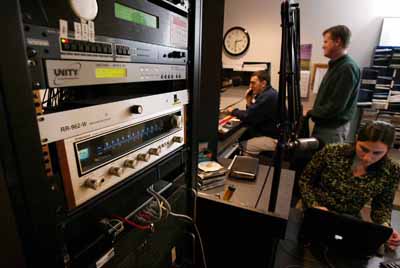
(RNS5-APRIL06) In the studio of New Jersey’s WJUX, a new Christian radio station known as
The Bridge, general manager Dennis Radeke (center) oversees operations with Kim McCarrick, the
station’s assistant general manager, and her brother Mike McCarrick, a production intern. See RNS-
CHRISTIAN-RADIO, transmitted April 6, 2004. Photo by Andrew Mills.
ST. LOUIS (RNS) A poster in the studio of Christian music radio station JOY-FM depicts Jesus wearing a crown of thorns, with the iconic Gateway Arch in the background. Beneath it, a verse from the book of Joshua proclaims, “Shout! For the Lord has given you the city.”
On Wednesday (July 7), with a move to a more powerful 100,000-watt signal and a new home on the FM dial, JOY and its listeners can start shouting.
In May, the Federal Communications Commission approved JOY-FM’s $18 million purchase of the signal at 99.1 FM from the Lutheran Church-Missouri Synod, which has broadcast classical music from its KFUO-FM station since 1975.
The move means JOY gets to boost its signal and its audience substantially, but it has enraged classical music fans.
KFUO-FM devotees have tagged JOY’s listeners as enemies of high culture — champions of derivative, evangelical schmaltz who killed off Brahms to win souls.
On a Facebook page called “Stop the Sale of KFUO Classic 99 in St. Louis!,” WLarry wrote, “as a Christian, I am sickened by this sale. I feel like I’m experiencing the death of a close friend.”
But JOY’s takeover of the stronger signal opens a new market for the fastest-growing musical radio format in the country: contemporary Christian music, or CCM, as it’s known in the industry.
The station’s new, more powerful signal “will allow me to reach people outside St. Louis who may not have heard my music,” Christian music superstar Chris Tomlin said before a JOY-sponsored concert on June 18.
Local CCM fans have waited since at least 1997 for a significant spot on the radio dial. JOY-FM listeners and members see it as more of a Christian community than a source of entertainment.
While other FM rock stations sponsor bikini car washes or chicken-wing eating contests, JOY-FM distributes Bibles at prisons, stages free concerts for single moms and collects books and toys for children in area hospitals.
“It’s more like a ministry spreading the name of God,” said one caller named Christine, who called in during a drive-time show hosted by general manager Sandi Brown and Greg Cassidy. “It gives the Christian community a voice in a cold, dark, decaying society.”
As of May, there were 946 contemporary Christian music format stations in the U.S., according to trade publication Inside Radio, second only to country music’s 2,006 stations. Like JOY, 82 percent of CCM stations are listener-supported.
The number of CCM-format stations has increased 72 percent in the last 10 years, according to Inside Radio, while the number of country music stations declined 9 percent.
Christians are “a huge segment of the radio audience,” said radio industry consultant Donna Halper. “They just don’t want to hear dirty lyrics when they get in the car with their kids.”
JOY’s existing transmitters cover a potential audience of just over half a million, according to Brown. Currently, the station has fewer than 100,000 listeners. The new signal boosts its potential audience to 2.7 million.
The shift has real dollar value for the Christian music industry. Grant Hubbard, vice president of national promotion for Nashville, Tenn.-based record label EMI’s Christian Music Group, said that in the last decade, St. Louis has underperformed other markets in terms of Christian music sales and concert ticket sales.
The June 18 concert that featured EMI artists Tomlin and TobyMac drew about 5,000 people. The same act in Houston would have sold nearly triple the number of tickets, Hubbard said.
TobyMac’s manager, Laurie Anderson, said a healthy Christian radio market is crucial. “When you’re looking into tours, you choose markets with CCM, because the station has already cultivated your fans in that city,” Anderson said.
In the crowd at the Tomlin show, 32-year-old Matt Rector of Park Hills, Mo., stood near the front of the stage with his three sons — ages 8, 10 and 12. It was the boys’ first concert experience, he said. They knew the music from church — and from the radio.
“We have (JOY) on all the time,” Rector said. “We never change the station.”
It’s that kind of personal connection that helps fuel the growth of stations like JOY-FM. Co-hosts Brown and Cassidy are part therapist, part pastor and part DJ. Callers described how JOY helped them through a rough time in their lives — the unexpected death of a husband, connecting to teenagers, a healed marriage.
Brown said Christian radio fulfills a vital Monday-to-Saturday gap in the lives of church-going Christians. “We’re not church, but we’re a daily connection you don’t get in church,” she said.
(OPTIONAL TRIM FOLLOWS)
Listeners, in turn, have responded to help the station survive. Each May, the station stages a three-day fund drive, asking listeners to finance the next year of operations. In 2001, it needed $480,000. This year, it asked listeners for $1.48 million.
Brown said 80 percent of the total came from gifts of $1,000 or less; 95 people gave more than $1,000.
Missouri-Synod spokeswoman Vicki Biggs said proceeds from the sale will be used to fund new ministries, “including broadening the use of technology to proclaim the gospel worldwide.”
Biggs and Brown denied reports that the Lutherans preferred to sell the signal to another Christian ministry. Like any other radio station, it was all business, they said.
“We were told in our first meeting with KFUO, `We’re only going to sell if we get top dollar,”‘ Brown said. “No Christian card was played.”
(Tim Townsend writes for The St. Louis Post-Dispatch in St. Louis.)




